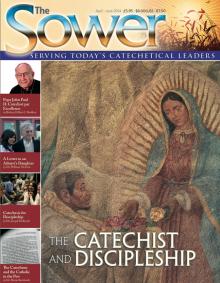Evangelizers thus take on the “smell of the sheep” and the sheep are willing to hear their voice. (Evangelii Guadium, 24)
Today when we hear the words disciple or discipleship these words have a specific religious connotation. We would normally not describe an apprentice plumber or student teacher as a disciple. In the world of the New Testament these words had a much wider usage. Among the ancient Greek philosophers, disciples learned by imitating the teacher’s entire way of life and not just by remembering the spoken words of the teacher. This is completely different from our modern lecture based modehttps://thesowerreview.org/sites/default/files/images/reading-torah.jpgl of classroom instruction. The first century philosopher Seneca appeals to the “living voice and intimacy of common life” of the disciple-teacher relationship of many different philosophers:
"Cleanthes could not have been the express image of Zeno, if he had merely heard his lectures; he also shared in his life, saw into his hidden purposes, and watched him to see whether he lived according to his own rules. Plato, Aristotle, and the whole throng of sages who were destined to go each his different way, derived more benefit from the character than from the words of Socrates."
Although there was considerable tension between the influence of Greek culture and Jewish way of life, it appears that the educational methods of the Greeks were taken over and adapted by rabbinic schools. Clearly the rabbinic model of discipleship builds on the Old Testament examples of relationships such as Moses to Joshua, Eli to Samuel, and especially Elisha’s call to “follow” Elijah (1 Kgs. 19:19-20), but it also adapts many features common to the Greco-Roman tradition of philosophers and teachers of rhetoric.
The rest of this online article is available for current Guild members.
This article is from The Sower and may be copied for catechetical purposes only. It may not be reprinted in another published work without the permission of Maryvale Institute. Contact [email protected]

















